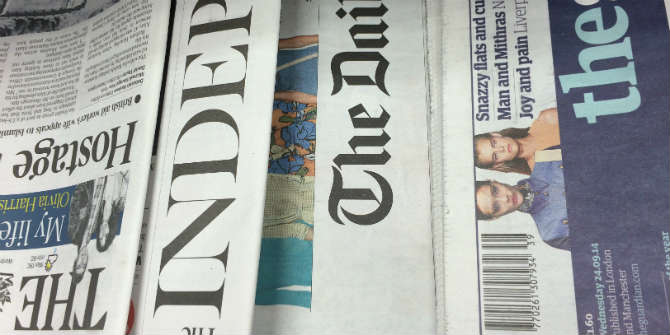 Since the rushed ‘deal’ between the BBC and the Government last week on the license fee, discussions -including the House of Lords Select Committee inquiry– have focused on the BBC’s governance arrangements and the process of reviewing license fee levels. With the independence of broadcasters again under the spotlight, LSE Postgraduate Anja Noster examines the lessons that the UK can learn from the German system.
Since the rushed ‘deal’ between the BBC and the Government last week on the license fee, discussions -including the House of Lords Select Committee inquiry– have focused on the BBC’s governance arrangements and the process of reviewing license fee levels. With the independence of broadcasters again under the spotlight, LSE Postgraduate Anja Noster examines the lessons that the UK can learn from the German system.
State Distance and Democratic Remit
Independence from the state, and the democratic remit are the founding principles of the German Public Service Media. In comparison with the ad-hoc UK approach to agreeing the BBC licence fee, the German approach is more formalised and includes a carefully designed procedure administered by a neutral regulator, which makes evidence-based recommendations for license fees built on demonstrable needs of the public service media.
The German PSM system is based on the principle of independent regulation and multiple ‘buffers’ between government and the broadcasters. The national parliament in Berlin does not interfere with regulation on broadcasting, but instead state (Länder) parliaments negotiate an Interstate Broadcasting Treaty (Staatsvertrag für Rundfunk und Telemedien) and agree necessary changes to broadcasting policies. Those negotiations and agreements are often based on prior actions and decisions made within the PSBs’ independent broadcasting councils, which are in charge of programming and appointing members of the administrative council, as well as a managing director. Representatives of civil society groups, such as politicians, clerics and others, sit on the councils. Since 2010, the broadcasting councils also have to conduct a democracy and quality check for PSB programming, similar to the BBC’s public value tes (called Drei-Stufen-Test).
As with any governance system, there are detractors. Some claim that the independence of PSM is compromised, because many of those appointed as council members and managing directors are politicians.
An Independent Regulator to Evaluate Financial Requirements of Public Service Broadcasters – The KEF
The German auditing commission, Kommission zur Ermittlung des Finanzbedarfs der Rundfunkanstalten (KEF), was established in 1975. The idea was that an independent institution might reassure people with regard to the reliability of PSBs. Its task is it to evaluate the financial requirements of the German Public Service Media, namely ARD and ZDF (first and second television channel), Deutschlandradio (radio) and ARTE. Based on their statements of planned expenditure, the KEF considers their actual needs and possibilities of savings and then issues a report including a suggested licence fee to the state parliaments. A 1994 decision by the Federal Constitutional Court (BVerfGE 90, 60–107 – Rundfunkgebühr) builds the legal frame for the current license fee calculation system: first, PSBs have to bid to the KEF. Second, those bids will be processed within the KEF (cost effectiveness and efficiency are the main points being considered). Finally, the KEF issues license fee recommendations to the state governments, which then decide on the final amount of the license fee, also looking at social compatibility issues.
The KEF consists of 16 independent members, one from each German state (Bundesland). In consultation with the broadcasting councils, they issue a detailed report on licence fees and costs for the PSBs every four years, and a progress report every two years. Therefore, the KEF plays an important role in the German media system as it is supposed to ensure impartiality and independence from federal and state government when recommending PSB funding models. Nevertheless, three key areas need to be considered in depth should this ever function as a role model for the British system:
- An over-complex procedure for the evaluation of financial requirements: Aiming for more transparency, validity and consistency, the KEF introduced indices that allow looking at costs and levels of efficiency. In order to calculate the financial needs of the PSBs, there will be a target-performance comparison and a detailed consideration of advertisement revenues, license fee revenues and programming, personnel and material costs. Like the BBC Trust Public Value Assessments, this procedure is complex and difficult to understand, which undermines the public legitimacy of the system. Some citizens consider it a ‘put-up job’ (prearranged pricing and no margins for price cutting)
- Recommendations are recommendations, not laws: the KEF issues a report including a licence fee recommendation. In the following though, the state parliaments still have the opportunity to veto the recommendation and to completely change the way of price setting. In 2007 the Federal Constitutional Court passed a decision to strengthen the role of the KEF vis-à-vis the state parliaments, requiring them to explain when they depart from the recommendations of the KEF. There is a fine line between delegating the actual decision to an independent body, and a weaker advisory role. This will need to be carefully considered
- Multiplicity of actors: this does not necessarily need to be a problem, but looking at the number of roles that KEF, Federal Constitutional Court and diverse broadcasting councils play in the German media system, it seems difficult to establish one sole level of decision making for media policy and to define tasks for all actors. In the end, most recommendations and decisions come together in the state parliaments, and the main considerations should be the quality of the research and evidence base, and introducing transparency and accountability at the appropriate points, so citizens can control this sensitive area of media-government relations
As UK policymakers consider the shape of governance structures and licence fee arrangements for the BBC in the Charter Review process, they could look closely at the German model, both at the part that works well and what can be learned from the problems it faces.
This post gives the views of the author, and does not represent the position of the LSE Media Policy Project blog, nor of the London School of Economics and Political Science.





